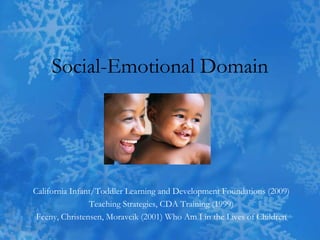
Social emotional
- 1. Social-Emotional Domain California Infant/Toddler Learning and Development Foundations (2009) Teaching Strategies, CDA Training (1999) Feeny, Christensen, Moravcik (2001) Who Am I in the Lives of Children
- 2. Social Domain How children relate to others How children make moral decisions
- 3. Emotional Domain How children learn to trust How children recognize and express their feelings How children understand and accept who they are
- 4. Social Development Helping children learn to get along with others Helping children understand and express their feelings and respect those of others Providing an environment and experiences that help children develop social skills
- 5. Influences Increased knowledge about self and others Influenced by Experiences and relationships that child have with significant adults in their lives Cognitive development
- 6. Cognition Effects Social Development Move from being egocentric – seeing the world from one’s one perspective Growing ability to understand how other people think and feel Increased understanding of cause and effect – connections between actions and consequences Change from concrete thinking to abstract thinking Understanding complex concepts like multiple relationships (mother is wife, daughter, aunt)
- 7. Social Competence: Infants Forges strong bonds with adults Develops trust Develops connection to secure attachment figure Begins to orient to people in the environment Becomes socially responsive Participates in games like peek-a-boo Becomes selective about who they response to Sometimes responds to another’s distress
- 8. Social Competence: Toddlers Concerned about the presence of principal attachment figure Prefers to play along with the exclusive attention of favorite adults (solitary play) Begins to enjoy nearby company of other children in play (parallel play) Tries to do something for a distressed person – patting Makes vocal exchanges in social play – turn-taking, social imitation, conflicts over toys Begins to develop genuine friendship
- 9. Social Competence The ability to initiate and maintain satisfying, reciprocal relationships with peers and adults. Children who lack social competence are at risk academic failure dropping out of school delinquency mental health problems
- 10. Emotional Development Develop as individuals who have: Characteristic needs Ways of expressing feelings Perceptions of themselves Develop a sense of Identity Self esteem Impulse control Capacity for autonomous responses Influenced by experience
- 11. Milestones of Emotional Development: Infant Signals need with crying and gazing Establishes attachment to primary caregiver Expresses a wide range of emotions through body movements and facial expressions Cannot tolerate frustration or control impulses Develops stranger anxiety between 6-9 months Amiable from 1 year
- 12. Emotional Development: Toddlers Vociferous and demanding at 2 Calmer and more sociable at 3 Begins to assert self strongly Can seem stubbornly self-centered and resistant to change Has little control of impulses Easily frustrated
- 13. Social-Emotional Development Foundations A child’s experience, expression, and management of emotions The ability to establish positive and rewarding relationships with others California Infant/Toddler Learning and Development Foundations, 2009
- 14. Social-Emotional Ability The child is able to: Identify and understand one’s own feelings Accurately read and comprehend emotional states of others Manage strong emotions and their expressions in a constructive manner Regulate one’s own behavior Develop empathy for others Establish and maintain relationships California Infant/Toddler Learning and Development Foundations, 2009
- 15. Responsive Caregiving Supports infants in beginning to regulate emotions Helps infants develop a sense of predictability, safety, and responsiveness Form early relationships that are nurturing, stable, and consistent “High quality relationships increase the likelihood of positive outcomes in young children” (p. 8) California Infant/Toddler Learning and Development Foundations, 2009
- 16. Emotion and Cognition Contributes ability to pay attention, make decisions, and focus on learning Influence a young child’s ability to persist in goal-oriented activity Seek help when it is needed Participate in and benefit from relationships California Infant/Toddler Learning and Development Foundations, 2009
- 17. Social-Emotional Foundations Interactions with Adults The developing ability to respond to and engage with adults (See Examples: pp.14-15) Relationships with Adults The development of close relationships with certain adults who provide consistent nurturance (See Examples: pp.16-17) California Infant/Toddler Learning and Development Foundations, 2009
- 18. Foundations Interactions with Peers The developing ability to respond to and engage with other children (See Examples: pp.18-19) Relationships with Peers The development of relationships with certain peers through interactions over time (p. 20) Identity of Self in Relation to Others (pp. 21-22) The developing concept that the child is an individual operating within social relationships California Infant/Toddler Learning and Development Foundations, 2009
- 19. Foundations Recognition of Ability The developing understanding that the child can take action to influence the environment (See Examples: pp. 23-24) Expression of Emotion(See Examples: pp. 25-26) The developing ability to express a variety of feelings through facial expressions, movements, gestures, sounds, or words Empathy The developing ability to share in the emotional experiences of others (See Examples: pp. 27-28) California Infant/Toddler Learning and Development Foundations, 2009
- 20. Foundations Emotion Regulation The developing ability to manage emotional responses, with assistance from others and independently. (See Examples: pp. 29-30) Impulse Control The developing capacity to wait for needs to be met, to inhibit potentially hurtful behavior, and to act according to social expectations, including safety rules. (See Examples: pp. 31-32) California Infant/Toddler Learning and Development Foundations, 2009
- 21. Foundations Social Understanding The developing understanding of the responses, communication, emotional expressions, and actions of other people. (See Examples: pp. 33-34) California Infant/Toddler Learning and Development Foundations, 2009
- 22. Resources California Infant/Toddler Learning and Development Foundations (2009). Feeny, Christensen, & Moravcik (2001). Who am I in the Lives of Children? Teaching Strategies (1999). Caring for Infants and Toddlers Bodrova& Leong, 2005, The Whole Child. Educational Leadership
